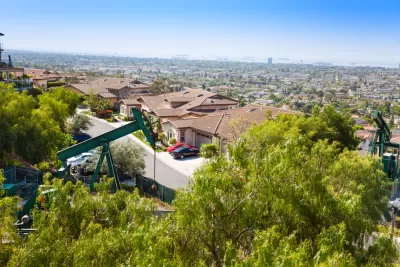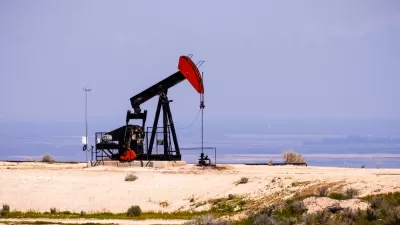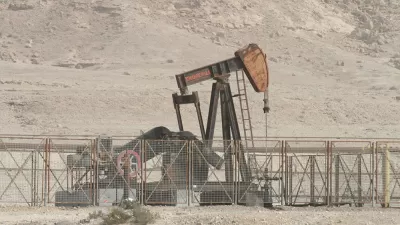A decision by the Bureau of Land Management on Oct. 3 may reverse the outcome of a 2013 lawsuit against the Obama administration by two environmental groups that effectively halted drilling in Fresno, Monterey and San Benito counties.

"The Trump administration Friday announced it would make 725,000 acres of land in California’s central coast open to oil and gas lease sales, ending a five-year moratorium," reports Miranda Green, energy and environment reporter for The Hill.
The decision by the Bureau of Land Management (BLM) made the federal land available for fossil fuel production across Fresno, Monterey, San Benito and other counties for the first time in half a decade.
"The BLM anticipates most new oil and gas development within the planning area to occur in or near existing oilfields in Fresno County," notes their decision, issued by their Central Coast Field Office in Marina, Monterey County. Fresno's population is over 994,000. The county seat, Fresno, is the fifth most populous in the state.
This decision also authorizes the BLM to issue, with controlled surface use stipulations, 14 previously litigated oil and gas leases in Monterey and San Benito counties.
"Voters in two of those counties – Monterey and San Benito – recently passed ballot initiatives banning the practice of fracking in their jurisdiction," writes Matthew Renda for Courthouse News.
The BLM maintains such ordinances only apply to lands within local jurisdiction and federal lands are governed by federal law.
Even so, Clare Lakewood, a senior attorney with the Center for Biological Diversity, said the BLM typically complies with local laws regarding energy policy and other land use matters.
"But the action also opens the door for new leases in eight other counties, raising the prospect of additional drilling in such spots as the Santa Cruz Mountains, the East Bay hills and eastern Santa Clara County," according to Kurtis Alexander of the San Francisco Chronicle. For details, see the 81-page Record of Decision [pdf].
Oil and gas drilling has been effectively banned since a successful 2013 lawsuit on the environmental effects of hydraulic fracturing was brought by the Center for Biological Diversity (see April 8, 2013, press release) and the Sierra Club against the Obama administration.
"In May, the BLM presented an environmental analysis of its plan, effectively meeting the court’s order to study and minimize fracking disturbances," adds Alexander. Kara Greene, a spokeswoman for the trade group Western States Petroleum Association, stated at the time, “We’re pleased that after five years, the process worked and the federal government has reaffirmed that hydraulic fracturing is a safe method of production in California."
A similar finding from an environmental analysis was released by the Obama administration in August 2014 which was thought incorrectly to reopen lease sales.
"The Center for Biological Diversity said Friday that it did not think the federal government had adequately addressed the impacts of fracking and was considering additional legal action to prevent the BLM from issuing new oil and gas leases," adds Alexander.
"We’ll fight tooth and nail to make sure it doesn’t happen," said the Center's Lakewood in a press release on Oct. 4 issued jointly with the Sierra Club.
"BLM officials estimate that up to 37 new oil and gas wells will be developed in the region over the next 20 years as a result of Friday’s decision," notes Alexander.
About 110 wells currently operate on federal land across the agency’s Central Coast district, with active drilling in Fresno, Monterey, San Benito, Alameda, Contra Costa and Santa Clara counties. The counties in the district where BLM land is not currently drilled include Merced, San Joaquin, San Mateo, Santa Cruz and Stanislaus.
"BLM can take requests from fossil fuel companies for plots to lease starting 30 days from now, after the appeal period has ended," adds Green for The Hill.
Related in Planetizen:
-
Report: Fracking Doesn't Pose Danger to California Groundwater, September 3, 2014
-
Environmentalists Win Major Fracking Lawsuit in California, April 12, 2013
FULL STORY: Trump administration ends five-year oil and gas drilling moratorium in California

Planetizen Federal Action Tracker
A weekly monitor of how Trump’s orders and actions are impacting planners and planning in America.

Chicago’s Ghost Rails
Just beneath the surface of the modern city lie the remnants of its expansive early 20th-century streetcar system.

San Antonio and Austin are Fusing Into one Massive Megaregion
The region spanning the two central Texas cities is growing fast, posing challenges for local infrastructure and water supplies.

Since Zion's Shuttles Went Electric “The Smog is Gone”
Visitors to Zion National Park can enjoy the canyon via the nation’s first fully electric park shuttle system.

Trump Distributing DOT Safety Funds at 1/10 Rate of Biden
Funds for Safe Streets and other transportation safety and equity programs are being held up by administrative reviews and conflicts with the Trump administration’s priorities.

German Cities Subsidize Taxis for Women Amid Wave of Violence
Free or low-cost taxi rides can help women navigate cities more safely, but critics say the programs don't address the root causes of violence against women.
Urban Design for Planners 1: Software Tools
This six-course series explores essential urban design concepts using open source software and equips planners with the tools they need to participate fully in the urban design process.
Planning for Universal Design
Learn the tools for implementing Universal Design in planning regulations.
planning NEXT
Appalachian Highlands Housing Partners
Mpact (founded as Rail~Volution)
City of Camden Redevelopment Agency
City of Astoria
City of Portland
City of Laramie





























